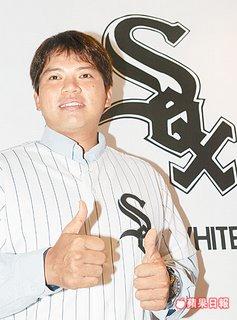Kenny Williams: A Beane or a Krause? -- Part 1
It’s incredible to see so much of the media and so many fans, for that matter, forsake the fact the Sox won the ’05 title and the fact that the Sox had back-to-back 90-win seasons for the first time since ’65. Usually there’s a three-year grace period or so, after a championship, where the GM and the coach are relatively safe from being torn apart by the fans and the media, but apparently Kenny won’t be afforded that immunity.
Perhaps it’s due to our nature, as Chicago sports fans, to assume the worst and fear all is lost, that has led so many to lose confidence in Kenny. I haven’t given up my faith yet; I still feel he is undoubtedly one of the best GM’s in the majors. I agree that his moves were ballsy and risky, but I see the direction he’s trying to take and I can see his reasoning. It’s possible that I’m underestimating the radical-ness of Kenny’s moves and this season could very well end up being his downfall, but only time will tell; at this time and point, I’m willing to give KW the benefit of the doubt. He did after all help get the Sox into the position where fans could make legitimate gripes that he’s scuttling a shot at the ’07 championship in favor of taking multiple shots down the road. I’d much rather have those gripes than debating whether the Sox will finish second or third in the division.
As I got to thinking about Kenny, his recent moves reminded me of two other GM’s in particular. One is lauded by many as the best GM in baseball, an innovative GM who has changed the way people analyze baseball. The other constructed the supporting cast to create one of the greatest basketball dynasties of all time, but was later disgraced in the eyes of fans as he sought to create another dynasty, this time from the ground up, and gambled the team’s future on signing free agents and later a risky trade. I’m speaking of course of Billy Beane of the Oakland A’s and Jerry Krause formerly of the Chicago Bulls.
Like KW, both of Beane and Krause got their start as scouts. I think this is at least partially responsible for why Beane and Krause are usually such keen evaluators of talent. While all three have made their mistakes (more on Kenny’s in later parts of this series), you cannot argue the fact they possess an eye for talent. Having such an eye for talent helped both Beane and Krause establish a team that could consistently win. When Krause stepped into the GM position, he already had Michael Jordan, but he was able to twice craft a team around MJ that would win three straight championships. That’s no small feat; thanks to his acquisitions of Scottie Pippen, Horace Grant, Bill Cartwright, Ron Harper, Toni Kukoc, Dennis Rodman, etc. he brought Chicago 6 championships, with the high point being the 72-win squad. Likewise, since Beane took over the A’s, Oakland has averaged 89 wins a season, while maintaining a super, tight budget. Although, Beane hasn’t won a championship, he’s hardly the one to be at fault, you can thank the “All-American Crapshoot” that is the MLB playoffs for that.
After runs of extended success, both Beane and Krause were faced with the prospect of overhauling their roster. Although neither move was technically, absolutely, 100% necessary, the terms at the time dictated that both Krause and Beane had to try and take a step forward for the good of their respective teams. Budget constraints forced Beane to surprisingly break up the “Big 3”, while the impending retirements of Phil Jackson and MJ as well as some bad blood with remaining players forced Krause to go into complete rebuilding mode. This is the point where the careers of Krause and Beane really start to deviate.
Krause sought free agency as the fix for the Bulls’ problems, and keyed in on freeing up cap space for the ballyhooed free agent crop of 2000 featuring the likes of Tim Duncan, Grant Hill, and Tracy McGrady. As we all know this plan failed miserable as Krause and the Bulls were spurned by even lower rung free agents like Tim Thomas and Eddie Jones. This led to the 2001 draft day disaster where Krause traded Elton Brand for Tyson Chandler. By most accounts, Chandler had a higher upside than Brand, and Krause banked on Chandler reaching said ceiling (keep this in mind for when the Brandon McCarthy trade is brought up, later on). Krause envisioned having Chandler and Eddy Curry team up and lead the Bulls to another period of dominance. His plan and his risk never took to fruition and eventually led to his resignation.
Beane, on the other hand, had a much more successful turn around, especially considering his team never had to sink as low as the Bulls did. After missing the playoffs for the first time in 4-years and realizing that budget constraints would cause the A’s to lose some of their star pitchers to free agency, Beane took the iniative to trade both Tim Hudson and Mark Mulder, 2/3 of the Big 3. There was talk at the time of Beane trading one of the three, but it came as a shock to many that he ended up trading two of them. Beane essentially sacrificed a few wins in 2005 (a year where they did not make the playoffs but remained very competitive) to ensure that his team would get some value in return and would not be sunk by the departure of Mulder and Hudson via free agency. (Keep this in mind when the Freddy Garcia trade is brought up, later on, as well as the thought of trading Mark Buehrle).
In my eyes, the stories of Beane’s and Krause’s career follow a similar arch until they diverge greatly at the end. They established winning organizations, and are faced with trying to secure continued success in the near future. Kenny is currently saddled with a similar situation. The Sox lose Javier Vazquez, Mark Buehrle, Jermaine Dye, and Tadahito Iguchi after ’07 and Jon Garland and AJ Pierzynski after ’08. Kenny could forsake the future and go broke for a championship in ’07, or try and preserve the Sox chances for winning a title now, while maximizing the team’s chances for prolonged success. In the coming years, we’ll get to see first hand whether Kenny’s methodology was a success or not. We’ll get to see if he’ll be a Krause or a Beane. Perhaps most importantly for baseball, we’ll get to see if Kenny’s plan of building around young, cheap pitchers (as Beane also did) takes hold, because that could cause a paradigm shift in the manner that teams build their rotations. We all know where I stand, but here’s hoping, again, that Kenny turns out to be a Beane.
In coming parts, I’ll compare Kenny’s recent trades to moves made by Krause and Beane and examine both the similarities and the departures to the moves and what that means to the future. Also, I’ll take a look at some of Kenny’s more noteworthy trades from over the years to see whether it affords Sox fans reasons to be optimistic or pessimistic about these recent changes.





